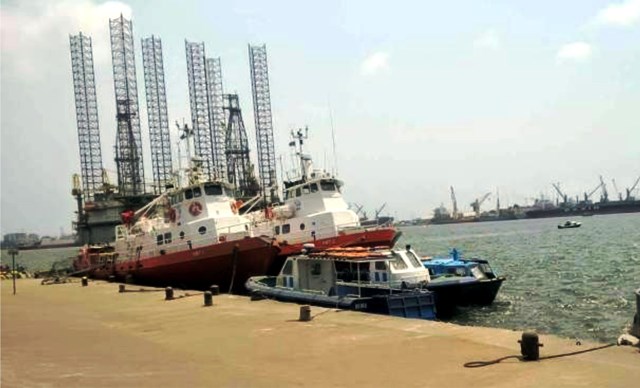Maritime
Why Importers Shun Eastern Ports

Despite the unabated traffic and the delay experienced at the Apapa and Tin Can Ports, Nigerian importers still prefer Apapa ports to the Eastern ports, citing over charges and insecurity as reasons
This is as shallow draft and high charges have been attributed to reasons why the Eastern ports have continually failed to attract vessels for years, according to investigations
The eastern ports which are located in the South South region include Calabar Port, Delta Port, Rivers Port at Port Harcourt, and Onne Port at Eleme have witnessed low patronage of vessels in recent years.
Recall that some importers weeks ago appealed to the Federal Government to open up the seaports in the eastern flank of the country to decongest ports in Lagos.
The importers argued that the designation of the Calabar, Port Harcourt and Warri ports for cargo transaction would bring the perennial traffic at the Apapa Port to an end.
But the traders in Lagos State and its environs said that they were experiencing hardships in getting their goods out of the Apapa Port.
Investigation over the weekend showed that while high situation is causing shallow draft at the Calabar Port and making it inaccessible to vessels, operations at the Port Harcourt Port are slowed down by constant pirate attacks and sea robbery that have made the port unpopular for foreign ship owners.
Also, shipping experts have argued that for the eastern ports to attract cargoes and to be an international standard maritime destination, they must attract huge vessels like the Very Large Crude Carriers (VLCC) and the Ultra Large Crude Carriers (ULCC).
But that can only be achieved by a deeper channel of at least 13 meters because smaller vessel would not reduce port cost.
With the shallow draught, there is a limit to the size of vessels the Calabar Port can accommodate and shipping, especially container shipping, is all about economies of scale. The larger vessels that call, the lower the cost of importing and exporting, and the lower the freight cost.
While the Calabar Port suffers from shallow draught, the Onne Port is combating insecurity such as pirate attacks and sea-robbery.
Due to pirate attacks, vessels entering Nigeria’s Onne Port are delayed for an average of six hours per night which amount to $45,000 (N16.2milion).
The delay, estimated at $7,500 per hour, is said to be fuelled by constant pirate attacks on the axis. Consequently, the importers of the consignments on board the vessel will have to pay for the delay.
The eastern ports including the Onne Port have been operating on the International Ships Ports Security (ISPS) Code 2 due to insecurity in the region as vessels that berth and discharge find it difficult to sail out at night for fear of pirate attacks.
Corroborating this, Acting Director-General of the Infrastructure Concession Regulatory Commission (ICRC), Engr Chidi Izuwah in a statement available to The Tide, expressed worry over the inability of vessels to sail out at night at Onne Port.
Izuwah regretted that vessels cannot sail out of the port as it is done in Lagos port.
“No night sailing at Onne Port and this is worrisome unlike what happens at Lagos Port where vessels can sail out at any time of the day,” he said.
Also an official in one of the container terminals at Onne Port, West Africa Container Terminal (WACT) exclusively told The Tide that vessels failed to sail out of the port at night for fear of pirate attacks.
The source said: “Night voyage is absolutely prohibited at Onne Port due to insecurity fuelled by pirate attacks.
“As a shipping company, you choose between your vessel being attacked and crew abducted and you staying over and incurring demurrage”.
Also speaking a shipping expert, Dr Kofi Mbia, warned that the surge in pirate activities could have a wrong impact on commercial trading in the shipping industry as it would affect the climate of confidence in trade and influence the rise in insurance premiums.
Mbia, a former chief executive officer of the Ghana Shippers’ Authority (GSA) warned of high insurance premiums over high pirate attacks.
“When your coast is infested with pirates then there is the tendency for insurance premiums to go up for vessels that are calling at your port because of the threat to the vessels and at the same time it affects the climate of confidence in trade”, he said.
Stories by Chinedu Wosu
Maritime
Maritime PCRC Seeks Intelligence Sharing With Western Ports Police

Maritime
Customs Hands Over Seized Cannabis Worths N4.7bn To NDLEA

Maritime
Customs Hands Over Three 21 Ft Containers of Expired Drugs To NAFDAC

-

 Politics2 days ago
Politics2 days agoAPC Releases Adjusted Timetable For Nationwide Congresses, Convention
-

 Sports5 days ago
Sports5 days agoHammers Beat Burnley To Boost Survival Chances
-

 Business1 day ago
Business1 day agoCustoms Seek Support To Curb Smuggling In Ogun
-
News1 day ago
Police Bust Kidnapping Syndicate In PH
-
Sports1 day ago
DG NIS Wants NSC Board Constituted, Seeks Increased In Funding
-
Sports2 days ago
Falcon Players Prepare For Title Defense
-
Sports1 day ago
‘NTF Will Build On Davis Cup Success For Brighter Future’
-
Sports1 day ago
NSC Disburses N200m Training Grants To 26 Athletes

